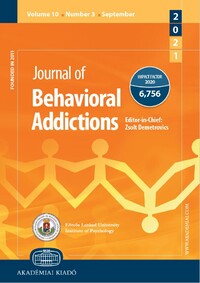Efficacy of short-term telemedicine motivation-based intervention for individuals with Internet Use Disorder – A pilot-study
Efficacy of short-term telemedicine motivation-based intervention for individuals with Internet Use Disorder – A pilot-study
Author(s): Laura Bottel, Matthias Brand, JAN DIERIS-HIRCHE, Stephan Herpertz, Nina Timmesfeld, Bert Theodor Te WildtSubject(s): Behaviorism
Published by: Akadémiai Kiadó
Keywords: telemedicine; eHealth; Internet addiction; Internet Use Disorder; gaming disorder; motivational interviewing
Summary/Abstract: Background. Internet Use Disorders (IUD) cover a range of online-related behavioral addictions, which are acknowledged and strengthened by the inclusion of (online) gaming disorder in the ICD-11 by the World Health Organization. Internet-based telemedicine interventions offer the possibility to reach out for individuals with IUD where the disorder emerges, in order to enhance their motivation to change their Internet use behavior. Methods. In the course of the short-term telemedicine motivation-based intervention, adult participants took part in two webcam-based counselling sessions based on Motivational Interviewing techniques. Two weeks after the first webcam-based counselling session the second took place. Participants completed questionnaires regarding the motivation to change their Internet use behavior (iSOCRATES) and symptoms of IUD (s-IAT) at three times of measurement: t0 (pre-intervention), t1 (mid-intervention) and t2 (post-intervention). Results. 73 affected individuals (83.6% male, average age 35 years (SD = 12.49) took part in the whole intervention including the questionnaire-based post intervention survey (t2). Over the course of the telemedicine intervention, a significant increase in the motivation to change with regard to the own Internet use behavior as well as a significant reduction in the symptom severity of an IUD and duration of Internet use (reduction of 2 hrs/d) were shown. Conclusion. The telemedicine pilot study shows that online-based consultation can be effective and helpful for individuals with IUD. Therefore, such a telemedicine intervention may be a suitable extension to the already existing analogous care system.
Journal: Journal of Behavioral Addictions
- Issue Year: 10/2021
- Issue No: 4
- Page Range: 1005-1014
- Page Count: 10
- Language: English

